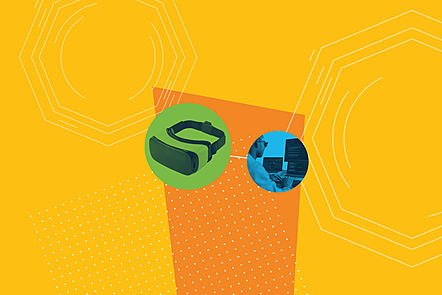Understanding digital wellbeing: What is technology literacy?
Discover what technology literacy means, as we explore all there is to know about this term including the benefits and skills needed.

We are living in a world where technology is more prominent than ever, and whilst technology brings a wealth of information and benefits, it’s crucial to be able to use this technology safely and effectively.
To help build your understanding of technology literacy, we’re going to explore what it is, why it is important and provide some technology literacy examples.
What is technology literacy?
Whether you’ve heard of the term technology literacy or not, it’s important to get a good understanding of what it means before we get started. Similar to media literacy, technology literacy is the ability to use, understand, manage and assess technology effectively, safely and responsibly. This includes evaluating, creating and integrating information via technology.
Technology itself is a broad term, which Oxford dictionary defines as scientific knowledge used in practical ways in industry. To put it simply, technology is any device, method or system created to solve a problem or assist with a task. However, when we discuss technology throughout this article, we will be referring to digital technologies.
Technology literacy combats unsafe and irresponsible usage of technology, and creates an effective environment for using tech. The term is tied in with digital literacy, which is the ability to understand and effectively use digital information. Technology literacy is relevant to all forms of technology, including computers, smartphones and tablets.
Technology literacy vs media literacy
Both of these methods are related to the broader term digital literacy. However, although both are tied to digital, media literacy can be used in regards to all kinds of media including newspapers, books and radio.
As we discussed in our media literacy blog post, media literacy is the ability to understand information that is presented to us and respond appropriately. Media literacy is more focused on the digesting of information and deciding what to trust and how to avoid fake news. On the other hand, technology literacy encompasses the general navigation of technology and using it well.




Why is technology literacy important?
What was once a luxury is now a common and easily accessible tool in many households today. Technology can be used to order yourself a meal, study an online course and even find yourself a date. It only makes sense to be safe and sensible when using something that has such an impact on all aspects of our lives.
So, what is it that makes technology literacy so important? The truth is that, since technology plays a key role in many aspects of our daily lives, it has a lot of impact on ourselves and our wellbeing. We need to make sure that we are navigating tech in a way that benefits us rather than allowing any negative repercussions.
Sadly, this is easier said than done. There are risks and drawbacks to using technology, even if it does provide many benefits. Being technology literate invites a healthier and more effective way to utilise the tools which are so relevant to many of us. Some things to be cautious about include:
- Overuse of technology – having access to a variety of tech is a great thing, but it’s easy to become too dependent on technology. Tech literate individuals will be wary not to spend too much time using tech as it can have both physical and mental ramifications.
- Privacy – technology is available to many individuals, both good and bad. Unfortunately there are those who use tech with malicious intent, so you need to be safe and secure when using technology. This includes using safe passwords, only browsing trusted sites and being cautious with what you download.
- Incorrect information – without being aware of which websites and information sources are reliable, you could be consuming and sharing false information. Technology literate individuals should be able to differentiate between fake news and reliable information.
What are the benefits of technology literacy?
Now we know why technology literacy is important, let’s look at how we can benefit from technology literacy. What benefits go hand-in-hand with tech literacy skills?
Technology is useful
Technology can assist with many tasks, so knowing how to use it well can benefit you in many areas. Tech-savvy people can use technology to help with things such as language learning, productivity management and meal planning. Understanding technology and knowing how to use it well will make it more helpful.
Digital skills
Being comfortable with technology and knowing how to navigate it will allow you to build on your digital skills. Living in the 21st century, digital skills are a game changer when it comes to finding work – one study found that 82% of middle-skill jobs require digital skills. The digital skills gap means that those with the necessary technology skills could have a better chance at securing a job.
If you’d like to upskill and take advantage of the digital skills gap, check out our Digital Skills for Work and Life course.
Boosts student engagement
Multiple studies have shown that when used in a classroom setting, the introduction of technology can boost student engagement. Technology makes for an immersive, engaging experience which supports students’ learning. By using technology in the classroom, we are also allowing students to become familiar with using tech and build on their technology literacy skills.
Technology makes things easier
The use of technology in our current world is almost inevitable; technology is all around us. However, it isn’t always easy knowing what to use and where to find it. Being tech literate means that you can use the correct technology tools with ease, and know where to look for them. This includes knowing which sites are safe to view for underage viewers, or knowing which settings to select on social media platforms.




Technology literacy skills
It’s clear that being technologically literate is key to having a safe and enjoyable experience when using technology. But what skills do you need to become technologically literate? Let’s look at some examples of tech literacy skills:
- Communication – the ability to communicate online is an important skill in regards to technology literacy. Actively using technology doesn’t just involve consuming information – it involves making your own content and sharing it with others too.
- Comprehension – one of the most vital technological skills is the ability to comprehend the information we receive from technology. Just as crucial as traditional reading and writing literacy, we should be able to make sense of what we are reading and viewing with tech.
- Evaluating information – as we mentioned briefly when discussing the reliability of technology, it isn’t always easy to determine what information is correct. One of the technology skills needed to be literate is the ability to evaluate information. This means critically analysing information to determine accuracy, validity, reliability and authority of information.
- Adapting – technology is constantly changing and evolving, bringing new useful applications and brand new forms of technology to learn about. Tech literate individuals should be able to adapt and pick up new skills needed to navigate technology – whether it’s a new social media platform or using a new phone model.
How can I become tech literate?
So, how can you go about becoming tech literate and building these skills? Being exposed to technology means that you’ll be able to practice your skills and use technology until you’re comfortable with it.
However, to build the skills necessary for tech literacy, you can research what you need to know about specific types of technology. Keep up to date with any changes and try to stay on top of technology trends. Another great way to develop your skills is to take some online courses and really broaden your knowledge. Why not try our Digital Wellbeing course or our Step into Digital Technologies course?
Who can benefit from technology literacy?
Technology is at the heart of many of our lives, regardless of age group. Younger generations tend to rely more on the use of technology and the internet, but it is not exclusive to younger age groups. Since all age groups use technology, we can all benefit from the knowledge of technology literacy.
It is likely that children will be exposed to technology at an early age seeing as the use of technology within schools is increasing. Thus, it’s important to teach younger generations about tech literacy and safe use of technology. Digital technology is now seen as more of a foundational skill, rather than a unique skillset to have.
Technology literacy can be taught to young students to ensure that they are aware of how to safely use technology they will inevitably come into contact with. Schools are already teaching digital skills, and technology in the classroom is on the rise.
Technology literacy examples
We’ve already discussed some of the risks involved in using technology and why technology literacy is such a vital skill. Now, let’s look at some examples of technology literacy in action.
Content creation – online content comes in many forms, and being able to contribute to the bank of online content requires tech literacy skills. Deciding what to post and where to post it needs consideration, whether it be a Youtube video, blog post or Instagram reel.
Communicating – a standard use of technology is communicating with other individuals, from friends and family to global audiences. Tech literate individuals should be able to communicate using the appropriate platform for their needs, and be able to navigate said platform effectively. Sending and receiving emails is a great way to communicate using technology.
Research – we are lucky enough to have access to billions of pages worth of content online, which makes finding answers to our questions easier than ever before. Understanding where to look for information and what to ask to solve your questions is a great way to demonstrate technology literacy.
Virtual reality – it isn’t all about computers and phones – new technologies such as virtual and augmented reality are great ways to explore technology. Virtual reality can be used for many different things, including learning and games. Constructing your own virtual reality experience is a fantastic example of using technology literacy skills as it requires a strong understanding of the technology involved.




The future of technology literacy
Technology is continuing to evolve at a rapid pace – we are seeing new variants of tech and the already extensive list of technologies are evolving. The IT industry is even on track to reach 5.3 trillion dollars by 2022. But what does this mean for the future of technology literacy?
New technologies take getting used to, and provide both new risks and opportunities. Take the recently announced Metaverse for example; a completely new alternative reality experience taking the world by storm. Metaverse will be a mix of virtual reality and augmented reality to create a fully immersive experience.
With new technologies rolling out, you may need to get used to navigating them and learn new skills to effectively use them. After all, browsing a computer is a very different experience to visiting a whole new world via virtual reality.
Be one step ahead of the crowd when Metaverse drops and explore our Introduction to Virtual, Augmented and Mixed Reality course.
Final thoughts
As we’ve explored, technology literacy is an essential skill for navigating the technology-rich landscape of our future. We hope that this article has broadened your perspective on the use of technology and how you can use technology responsibly.
If you’re keen to learn more about using technology effectively, check out our courses on Embracing Digital Technology and Digital Wellbeing.






